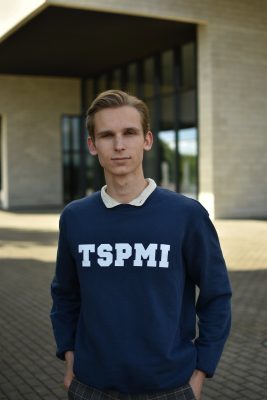
Elijas Augustas Kavaliauskas
IIRPS VU student, VU SR IIRPS Integration coordinator
How did you choose to study at VU TSPMI? What are your favourite subjects to study?
I started my studies at IIRPS after some initial deviation. From the very beginning, when I was finishing school, I was interested in the various principles of the world, so I started studying in the VU Applied Physics programme. However, after a while, I realised that physics was exploring the world from a different angle than the one I was interested in – I wanted less thermodynamics and more behaviourism. I took the next step and chose IIRPS. People are a significant part of our world, so studying society and its impact on the world is a natural choice. Hence, the courses in philosophy and social science research methods were interesting, and there were also interesting topics in comparative politics.
What encouraged you to become a mentor, and how did you decide to later become the integration coordinator at VU SR IIRPS?
The experience at University – the same change of studies, academic successes and failures – was the stimulus. I was able to offer a wide range of advice to people starting their studies. Often older students are intimidated by the stories of courses and exams still to come. I can tell you that everything is manageable, even if you fall into a hole. I was also impressed by the community of Vilnius University from the very beginning, so I couldn’t just be an observer. I really wanted to get involved in this environment because it’s made up of people just like me. And I became an integration coordinator because I found my niche in the after-school activities as a mentor. At the University, I was involved in pretty much every possible activity under the umbrella of the Students’ representation, i.e. the socio-academic process, communication, marketing and so on. It is very difficult to explain the reasons for my interests – I usually want to say, “it is what it is”. However, in the field of integration, I see the link between old and new students as essential to the strength of our community. When that initial hierarchy disappears, students can feel much freer to act within the University.
What are your impressions after the freshmen camp? How was the preparation for it?
This year, the camps returned to the traditional three-day format, which was not possible for the last two years due to the pandemic. It is good to see the difference between the one-day and three-day camps, where the freshmen leave the latter much different than when they arrived – much more courageous and motivated. It was not too difficult to prepare, as I had already attended the Physics Faculty’s Camp in 2018, so I had seen what the camp looks like and what the possibilities are. Of course, this year I had to organise the camp myself with a team, but last year’s experience of organising a one-day camp as a mentor also helped. In addition, people who have already graduated from IIRPS, who organised the camp in Kiskiai before the pandemic, helped in the preparation and even in the implementation process. I can only repeat what Morgana Daniele, who attended the camp, said, that the community of the Institute is not limited to those who are currently studying there.
Could you share some ideas and plans on how you will try to integrate the new part of our community – the foreign bachelor students?
The first thing, of course, is the accessibility of our community to international students. We already have examples of this, as we organised the freshmen’ camp in English, and the information on the Institute’s website is also communicated in two languages. The ambition and one of the common goals of the VU Students’ Representation this year is that university programmes, clubs, and projects (not limited to the Institute) should apply this and that international students should have an equal opportunity to participate in university life. Moreover, as this is the first year for our Institute with international undergraduate students, it is necessary to monitor the ongoing integration process and highlight areas for improvement. This is supported by colleagues from the faculties with existing experience in integrating international students.
What would you like to wish the IIRPS VU community?
Most of all, I would like to wish for openness in communication and the courage to embrace change. IIRPS VU is a research institution, so the ability to share and communicate with each other must be one of its fundamental foundations. The development of science in history has gone hand in hand with the advancement of the means of communication – writing, letters, the telegraph, and the Internet were inventions that gave impetus to scientific progress. So in the Institute, reflecting the name of the University, we need to create a space for the spread of ideas and opportunities to analyse them.







